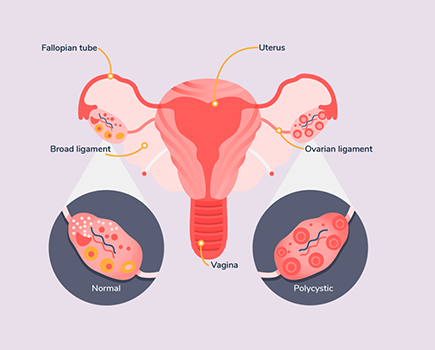Clik here to view.

Polycystic Ovarian Syndrome (PCOS) is a hormonal imbalance that affects 6 to 12% of American women of childbearing age. This common disorder causes the ovaries to enlarge with numerous fluid-filled cysts (follicles) that do not regularly release with ovulation. Although not understood completely, scientists believe that PCOS causes are due to a combination of genetic and environmental factors.
In our previous blog, we got into the details of PCOS, the effects this condition has on your health, and how to diagnose PCOS. We also talked about some of the common symptoms, which as a recap, include:
- Irregular periods as a result of the lack of ovulation, which prevents the uterine lining from shedding every month.
- Excess hair growth in places where men usually have hair (face, back, chest, etc.)
- Hormonal acne, which is a result of excess androgen levels that cause oiler skin.
- Weight gain or a hard time losing weight.
- Hair loss that is similar to male-pattern baldness.
- Skin darkening that forms in body crease like those on the neck, groin, and under the breasts.
Image may be NSFW.
Clik here to view.
PCOS Treatment Options
The consequences of developing PCOS include infertility, obesity, and metabolic syndrome (diabetes, sleep apnea, high cholesterol). Even though there is no cure for PCOS, the management and treatment include weight loss, medications (birth control, metformin and Clomid), and ovarian surgery.
Before understanding the treatment options for polycystic ovarian syndrome, it is important to understand the relationship between PCOS and obesity. Physicians have studied PCOS for years, and it is still unclear whether being overweight causes PCOS or PCOS causes obesity. What is known is that women who are considered obese are at a higher risk of developing PCOS, and women with PCOS are at a higher risk of struggling with obesity.
Image may be NSFW.
Clik here to view.
We also know that women who have PCOS are insulin resistant—meaning the cells in your body do not respond well to the insulin produced, and what results is an excess of insulin released from the pancreas. This is one of the main reasons women who have PCOS struggle with their weight.
Therefore, it only makes sense that you can also tackle polycystic ovarian syndrome symptoms by managing your insulin levels by losing weight, exercising, and eating a healthy diet.
